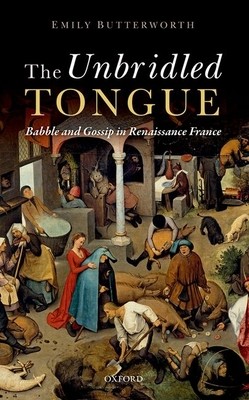
- We will send in 10–14 business days.
- Author: Emily Butterworth
- Publisher: Oxford University Press, USA
- ISBN-10: 0199662304
- ISBN-13: 9780199662302
- Format: 13.5 x 21.8 x 2.3 cm, kieti viršeliai
- Language: English
- SAVE -10% with code: EXTRA
Reviews
Description
The Unbridled Tongue looks at gossip, rumor, and talking too much in Renaissance France in order to uncover what was specific about these practices in the period. Taking its cue from Erasmus's Lingua, in which both the subjective and political consequences of an idle and unbridled tongue are emphasized, the book investigates the impact of gossip and rumor on contemporary conceptions of identity and political engagement. Emily Butterworth discusses prescriptive literature on the tongue and theological discussions of Pentecost and prophecy, and then covers nearly a century in chapters focused on a single text: Rabelais's Tiers Livre, Marguerite de Navarre's Heptameron, Ronsard's Discours des miseres de ce temps, Montaigne's "Des boyteux," Brantome's Dames galantes and the anonymous Caquets de l'accouchee. In covering the "long sixteenth century," the book is able to investigate the impact of the French Wars of Religion on perceptions of gossip and rumor, and place them in thecontext of an emerging public sphere of political critique and discussion, principally through the figure of the "public voice" which, although it was associated with unruly utterance, was nevertheless a powerful rhetorical tool for the expression of grievances. The Cynic virtue of parrhesia, or free speech, is similarly ambivalent in many accounts, oscillating between bold truth-telling (liberte) and disordered babble (licence). Drawing on modern and pre-modern theories of the uses and function of gossip, the book argues that, despite this ambivalence in descriptions of the tongue, gossip, and idle talk were finally excluded from the public sphere by being associated with the feminine and the irrational.
EXTRA 10 % discount with code: EXTRA
The promotion ends in 23d.04:09:05
The discount code is valid when purchasing from 10 €. Discounts do not stack.
- Author: Emily Butterworth
- Publisher: Oxford University Press, USA
- ISBN-10: 0199662304
- ISBN-13: 9780199662302
- Format: 13.5 x 21.8 x 2.3 cm, kieti viršeliai
- Language: English English
context of an emerging public sphere of political critique and discussion, principally through the figure of the "public voice" which, although it was associated with unruly utterance, was nevertheless a powerful rhetorical tool for the expression of grievances. The Cynic virtue of parrhesia, or free speech, is similarly ambivalent in many accounts, oscillating between bold truth-telling (liberte) and disordered babble (licence). Drawing on modern and pre-modern theories of the uses and function of gossip, the book argues that, despite this ambivalence in descriptions of the tongue, gossip, and idle talk were finally excluded from the public sphere by being associated with the feminine and the irrational.


Reviews